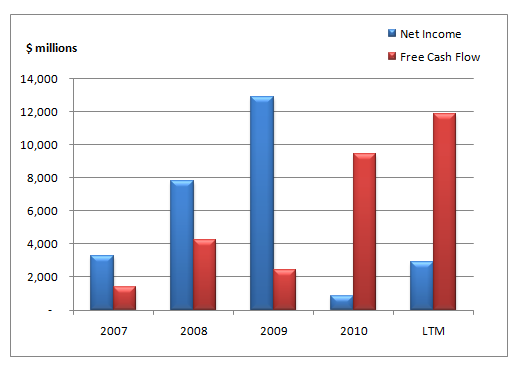Is Merck a Buffett Stock?
As the world's third-richest person and most celebrated investor, Warren Buffett attracts a lot of attention. Thousands try to glean what they can from his thinking processes and track his investments.
While we can't know for sure whether Buffett is about to buy Merck (NYS: MRK) -- he hasn't specifically mentioned anything about it to me -- we can discover whether it's the sort of stock that might interest him. Answering that question could also inform whether it's a stock that should interest us.
In his most recent 10-K, Buffett lays out the qualities he looks for in an investment. In addition to adequate size, proven management, and a reasonable valuation, he demands:
Consistent earnings power.
Good returns on equity with limited or no debt.
Management in place.
Simple, non-techno-mumbo-jumbo businesses.
Does Merck meet Buffett's standards?
1. Earnings power
Buffett is famous for betting on a sure thing. For that reason, he likes to see companies with demonstrated earnings stability.
Let's examine Merck's earnings and free cash flow:

Source: Capital IQ, a division of Standard & Poor's. Free cash flow is adjusted based on author's calculations.
Over the past couple of years or so, Merck has had some difficulty maintaining net income, though that was partly due to a number of (hopefully) one-time items like merger and restructuring charges and large legal settlements. Free cash flow actually grew considerably.
2. Return on equity and debt
Return on equity is a great metric for measuring both management's effectiveness and the strength of a company's competitive advantage or disadvantage -- a classic Buffett consideration. When considering return on equity, it's important to make sure a company doesn't have an enormous debt burden, because that will skew your calculations and make the company look much more efficient than it actually is.
Since competitive strength is a comparison among peers, and various industries have different levels of profitability and require different levels of debt, it helps to use an industry context.
Company | Debt-to-Equity | Return on Equity (LTM) | Return on Equity (5-year average) |
|---|---|---|---|
Merck | 32% | 5% | 22% |
Pfizer (NYS: PFE) | 47% | 10% | 12% |
Eli Lilly (NYS: LLY) | 47% | 39% | 26% |
Bristol-Myers Squibb (NYS: BMY) | 34% | 30% | 26% |
Source: Capital IQ, a division of Standard & Poor's.
Historically, Merck tended to generate high returns on equity while employing a modest amount of debt.
3. Management
CEO Ken Frazier has been only been at the job since the start of the year, though he served in other positions at the company for a few years prior. He also was a manager at MedcoHealth.
4. Business
Product diversification at the largest pharmas helps to reduce the risks from disruption, but pharmaceutical companies must constantly invent new drugs to replace old ones as their patents expire, and Merck is certainly no exception. (Though it should be noted that Buffett owns a large stake in Johnson & Johnson.)
The Foolish conclusion
Whether Buffett would ever invest in Merck, we've learned that, while we might be able to give it a pass on its low net income for the one-time nature of some charges, it doesn't particularly exhibit the other characteristics of a quintessential Buffett investment: high returns on equity with limited debt, long-tenured management, and a straightforward industry.
If you'd like to stay up to speed on the top news and analysis on Merck or any other stock,add it to your stock watchlist. If you don't have one yet, you can create a watchlist of your favorite stocks byclicking here.
At the time thisarticle was published Ilan Moscovitzdoesn't own shares of any company mentioned. You can follow him on Twitter@TMFDada. The Motley Fool owns shares of MedcoHealth Solutions and Johnson & Johnson.Motley Fool newsletter serviceshave recommended buying shares of Pfizer, MedcoHealth Solutions, and Johnson & Johnson.Motley Fool newsletter serviceshave recommended creating a diagonal call position in Johnson & Johnson. Try any of our Foolish newsletter servicesfree for 30 days. We Fools may not all hold the same opinions, but we all believe thatconsidering a diverse range of insightsmakes us better investors. The Motley Fool has adisclosure policy.
Copyright © 1995 - 2011 The Motley Fool, LLC. All rights reserved. The Motley Fool has a disclosure policy.

